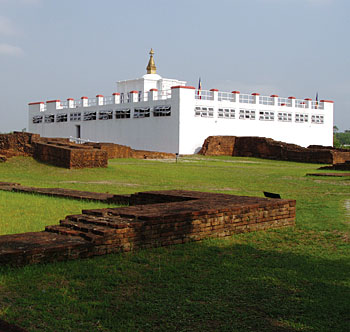 |
LUMBINI: A month ago, I visited mesmerising Angkor Wat in Cambodia. As I walked through the 12th century ruins, I thought of our historic Lumbini. As the birthplace of Lord Buddha, Lumbini has not just religious but economic value as well. But we cannot even begin to compare the number of visitors in Lumbini to the two million that Angkor Wat plays host to every year. Great guidebooks are available on Angkor but very little information exists on Lumbini that is traveller-centric. Lumbini has become an extension of the Buddhist circuit tours out of India, rather than the other way around.
The Lumbini Development Trust (LDT) was formed in 1985 to consolidate activities in the area, under the patronage of a royal family member. The objective of the Trust was similar to that of other such trusts during the Panchayat era � to control a money-spinner. The LDT leased out land in Lumbini on the cheap to different organisations to build monasteries. These organisations were not required to contribute to any other infrastructure development, so have now become very profitable. Some of these monasteries, constructed by non-Nepalis, are open only to pilgrims of their own nationality while others are in effect guesthouses in monkish garb. Although the LDT has no official way to link this income to their own, it is quite clear that the Trust isn't running on small change.
While it is good to see domestic tourism picking up in Lumbini, some of its negative aspects cannot be ignored. There is limited visitor management or a code of conduct to prevent irresponsible behaviour that damages the monuments, which can start from something as simple as scribbling on the walls. We need to take a leaf of learning from the temples in Bangkok, which have been able to enforce strict codes on silence, photography, and on touching the artifacts or damaging gardens.
Further, private enterprises, especially the hotels that have been set up around Lumbini, are focused on squeezing tourists for the maximum. These enterprises are keen on short-term returns rather than building customer relations for long-term business. They do not even consider that a customer may perhaps come again or refer another customer.
However, the potential is tremendous and one needs to move away from the myopia of the master plan of 1978. We need to change our thinking, and embrace the idea of a conservation area of more than 600 square kilometres that will encompass many heritage sites. The area can then be developed under public-private partnership. Local and even international business firms would be interested to invest if the brand Lumbini is marketed well. Ownership can remain with government and the communities who live there, but professional firms can manage the area and share revenues. An airport is a must and the business challenge is to keep tourists for at least two to three nights in the area. Lumbini can be a centre for international hotel chains, learning centres, rehabilitation and healing centres and other avenues of business.
If Vatican, Jerusalem, Mecca, Kumbh and other religious sites can draw such large numbers of people, why can't we get our act together?
READ ALSO:
Branded brew, PAAVAN MATHEMA
Nepal in America, PRABHAT BHATTARAI



